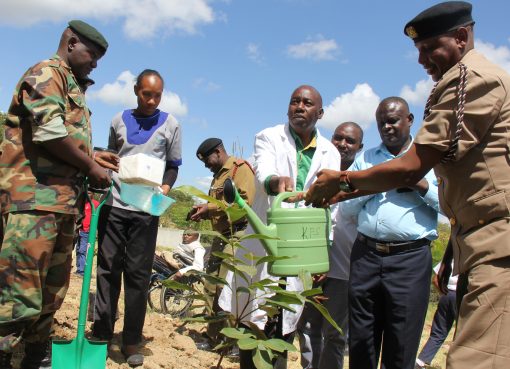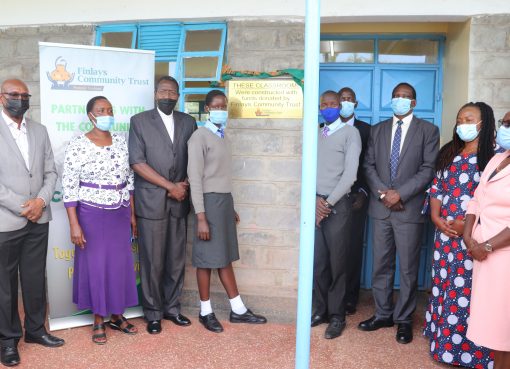Nakuru County has now incorporated free medical checkups for Non-Communicable Diseases (NCD) in services offered by Beyond Zero Clinic within the devolved unit.
The Executive Committee Member for Health, Dr. Zachary Gichuki Kariuki said the County had two fully equipped and staffed Beyond Zero Clinic trucks that had a capacity to offer comprehensive screening centres in all its 55 wards.
“One of the biggest burdens with non-communicable diseases is that those having them have no idea, and so if you do not know you are sick you are unlikely to seek treatment,” he noted.
Non communicable diseases such as cancer, asthma, diabetes and hypertension among others do not have distinct symptoms like malaria or pneumonia which are associated with fever and headaches, and people only find themselves diagnosed with the disease when they go for other checkups,” observed Dr Kariuki.
The Kenya National Strategy for the Prevention and Control of Non Communicable Diseases: 2015-2022, highlights the importance of prevention, as a means to reduce the number of patients seeking treatment.
It mandates the Department of Health and devolved units to come up with strategies and policies that will govern the screening centres when they are rolled out.
Speaking when he graced a free medical camp at Gituamba B village in Ndungiri location within Kabazi Ward in Subukia sub county Tuesday, the CEC stated that the department of health had set up 29 cancer screening centres in the County.
“Most low income earners are unlikely to go for routine medical checkups which are sometimes costly. The high death rates among our grassroots population has been due to late diagnosis, shame in seeking treatment, low income and fear of being found that they have the diseases.
Early detection gives you the best chance for getting the right treatment quickly, avoiding any complications. By getting the correct health services, screenings, and treatment you are taking important steps toward living a longer, healthier life,” stated the CEC.
Data from County health department indicates that lifestyle ailments such as cancer and cardiovascular diseases have significantly reduced life expectancy of Nakuru aged population.
The Chief Officer Medical Services, Dr. Solomon Sirma said out of the estimated 2,180,000 of the county’s population in 2018, those aged 65 years and above stood at 58,860.00 representing a mere 2.7 percent.
“This population segment is increasingly bearing the greatest burden on non-communicable diseases and injuries, particularly those that occur as a result of falls.
The County’s health system needs to invest in screening and geriatricians, doctors who specialize in the elderly and the diseases that affect them, either in private or public health facilities,” observed Dr. Sirma.
The Chief Officer said the Nakuru Health Sector Strategic and Investment Plan 2018-2022, had put intervention measures to ensure that the aged population increased by 19.7 percent to 429,460 within the next four years.
The Kabazi MCA, Dr. Peter Mbae who has sponsored a motion compelling the devolved unit to set up screening centers at ward level said the financial burden of treating and managing NCDs threatens progress towards the Agenda for Sustainable Development, which includes a target of reducing premature deaths from NCDs by one-third by 2030.
“The majority of NCD cases go undiagnosed. The figures we are working with are only anecdotal. Vulnerable and socially disadvantaged people get sick and die sooner than people of higher social positions, especially because they are at greater risk of being exposed to harmful products, such as tobacco or unhealthy dietary practices, have limited access to health services.
The rapid rise in NCDs is predicted to impede poverty reduction initiatives in low-income areas of this County, particularly by increasing household costs associated with health care and loss of breadwinners,” said Dr. Mbae.
According to the Chair of Kenya Society of Hematology and Oncology, Dr. Sitna Mwanzi, who is also an oncologist at Aga Khan University Hospital, more women, are going for screening than men but late after diseases have advanced.
Women also lead in new cancer cases with 28,688 getting the disease compared to 19,199 men, representing 56 per cent of the total new cases.
The motion by Dr. Mbae which has been approved by the County Assembly Speaker targets to increase budgetary allocation from the average Sh 6 billion to cater for screening.
“This huge chunk of money is spent on curing ailments that could have been easily averted through screening and early prevention measures. People must be encouraged to preemptively seek medical advice on how to live a healthy. They need to be taught to lower their risk of various conditions or diseases by maintaining a healthy diet, weight, and level of physical activity,” observed Dr. Mbae.
Kenya has the highest number of cancer-related deaths across East Africa, according to new data by the World Health Organization (WHO).
Cancer kills 32,987 Kenyans a year, an estimated 40 per cent of the 83,426 deaths reported in the three East Africa countries of Kenya, Uganda and Tanzania, according to the World Health Organization’s Globocan report that analyses new cases among men and women.
Tanzania comes second with 28,610 cases while Uganda had the least deaths at 21,829 or slightly above 25 per cent of all the cases reported by the three countries.
The prevalence of diabetes in Kenya has more than doubled in the last three decades, accounting for 20 per cent of deaths in the country.
With a national prevalence rate of between 3.1 per cent and 4.6 per cent (between 1.4 million and 2.1 million Kenyans), experts are warning that the cases are rising at an alarming rate.
Today, one in every 17 Kenyans has diabetes, and 12,890 people in the country died from both diabetes and high blood glucose in 2018.
A report jointly published by the World Health Organization (WHO) and Lancet on World Health Day last year, shows that the prevalence of diabetes in Kenya was six per cent in 2017.
Close to 100,000 persons die every year from complications related to hypertension, according to statistics released by the Ministry of Health.
One of the contributing factors, Ministry of Health Director of Medical Services Dr Jackson Kioko said, is that half of Kenyans have never been screened for pressure.
“That is why we are working to ensure that screening of blood pressure and diabetes is done at primary health care service providers (health centres),” he said.
According to the 2018 Health Sector Performance Review Report for 2016/2017, hypertension is the leading Non Communicable Disease (NCD) detected during outpatient visits. This contributes to 50 per cent of total hospital admissions and over 40 per cent of facility mortality.
The Beyond Zero Campaign is an initiative launched by First Lady Margaret Kenyatta to improve maternal and child health in the Country and to reduce mother to child transmission of HIV/AIDS infections.
The campaign which was unveiled in 2013 and has resulted in donation of fully equipped mobile clinics to all the 47 counties and has also expanded its scope to assist women suffering from fistula get medical treatment.
Its primary objectives have been raising awareness on the need for good maternal and child health and its relationship to a nation’s strength and prosperity and mobilizing funds to support maternal, newborn and child health initiatives and to focus public attention on the challenges surrounding maternal, newborn and child health in Kenya.
It has also focused on educating women on the need for a healthy lifestyle, such as participating in sports, and encouraging them to adopt preventive health strategies.
By Anne Mwale/Joyce Kishoyian




